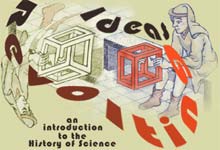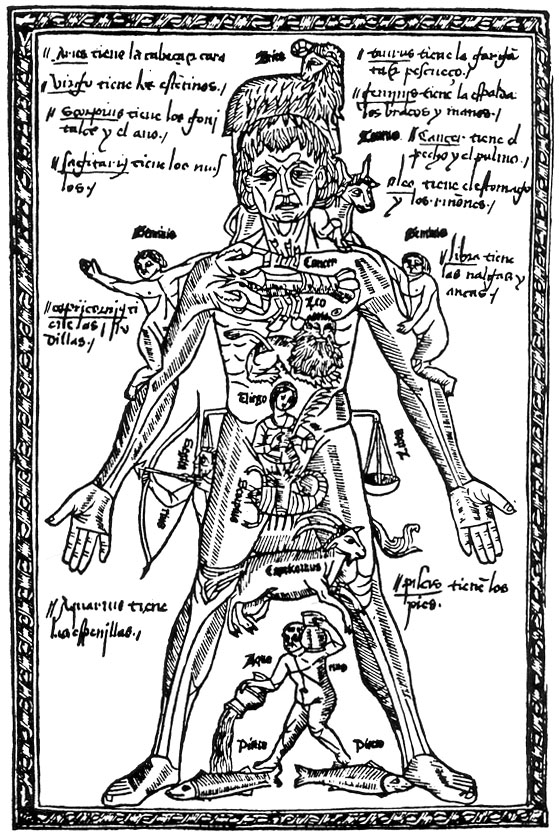
University of California, Irvine
Instructor: Dr. Barbara J. Becker

|
Week 3. Humanism excerpts from
|
Astronomy is an indispensable art; it should rightly be held in high esteem, and studied earnestly and thoroughly... For it teaches each man the condition and disposition of his soul, his heart, his thoughts; it teaches him whether they are false, or righteous and good, whether they are malignant or not. And it teaches how the hour of conception affects the child's fate, although it is less important than the conjuncture of the stars at the time of his birth.
![]()
![]()
![]()
The astronomer should be able to find his bearings in the firmament with the help of his natural reason, in a natural way, as a philosopher or a physician finds his way among the things of nature, which derive from the elements. But he should not have a higher opinion of his art, and place more reliance in it than behooves a prisoner. The prisoner, too, has all the qualities that belong to a man, but he is prevented from unfolding them; he cannot do what he wants. The same is true of the firmament: it lies imprisoned in the hands of the Supreme Mover. What this hand intends to do with it is hidden to the astronomer.... For his art may be impeded, furthered, or changed by the hand of the Supreme Helmsman.
![]()
![]()
![]()
Know that there are two kinds of stars--the heavenly and the earthly, the stars of folly and the stars of wisdom. And just as there are two worlds, a Little World and a Great World, and just as the little one rules over the great one, so the stars of the microcosm rule over and govern the Stars of heaven. For never forget that God has created the planets and all other stars not to rule over and govern man, but to obey Him as do all other created things.
In the stars there dwell reason, wisdom, ruse, strife, weapons, just as they do in us men. For we originate in them; they are our parents, and from them we have received our reason, wisdom, strife, etc. We have received all these from the stars, and accordingly these same things are in the stars; with the sole difference that in us men they become material, corporeal, visible, while in the stars they are invisible, subtle, spiritual. But let no one fancy that the wisdom and reason, which we have received from heaven, come directly from God! They do not come directly from Him, but exist in us men as a reflection of the corresponding qualities of the macrocosm, the Great Creature. But the wisdom which comes to us from God Himself stands above the other and is stronger than the heavens and the stars.

The art of astronomy helps us to discover the secrets of the innate disposition of the heart and makes manifest the good and evil qualities with which nature has endowed man. For man is a child of the Great World, and his nature is rooted in it. And because the earth and the stars are characterized by different natures, and the Kingdom of God by yet another, we must discover each of these by its signs.... For the art of astronomy distinguishes fancy and opinion from science and knowledge. And it teaches us with what great reason all things proceed in their course. What in its essence belongs to the ways of God must be learned from God, but concerning what belongs to the mortal sphere we are instructed by the firmament, the Great Creature.
![]()
![]()
![]()
It is not true that the firmament exerts a compelling action upon man; on the contrary man himself acts upon the world more than he is influenced by it. Therefore it would only be just if one refrained from writing about the action of the firmament as is usually done.... For this action has influence only upon the emotions and upon the heathen, sensual reason....
![]()
![]()
![]()
The stars are subject to the philosopher, they must follow him, and not he them. Only the man who is still animal is governed, mastered, compelled, and driven by the stars, so that he has no choice but to follow them--just as the thief cannot escape the gallows, the murderer the wheel, the fish the fisherman, the bird the snare, or the game the hunter. But the reason for all this is that such a man does not know himself and does not know how to use the energies hidden in him, nor does he know that he carries the stars within himself, that he is the microcosm, and thus carries in him the whole firmament with all its influences. Therefore he can rightly be abused as stupid and unwise, and must live in dire servitude to all that is earthly and mortal.
![]()
![]()
![]()
Man's wisdom is in no way subjected, and is no one's slave; it has not renounced or surrendered its freedom. Therefore the stars must obey man and be subject to him, and not he to the stars. Even if he is a child of Saturn and if Saturn has overshadowed his birth, he can still escape Saturn's influence, he can master Saturn and become a child of the sun.
![]()
![]()
![]()
The wise man is the man who lives by divine wisdom and is an image of Him in whose likeness he was created. The wise man rules over both bodies--the sidereal, or aerial, and the elemental, or material, body. Man must serve both, he must go the ways of each, in order to fulfill the law of the Lord and live in harmony with nature, and with the will of God and with the divine spirit. He must not prefer the mortal body and its reason to the eternal "image," nor must he reject this "image" for the sake of the animal body and find eternal salvation in the wisdom of the animal body.... The wise man lives after the image of God and is not guided by the ways of the world. And he who imitates the image of God will conquer the stars.
|